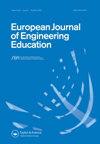使通往工程领导的道路更加公平:阐明对领导的(性别)支持
IF 2.8
Q2 EDUCATION & EDUCATIONAL RESEARCH
引用次数: 0
摘要
本文章由计算机程序翻译,如有差异,请以英文原文为准。
Making the path to engineering leadership more equitable: illuminating the (gendered) supports to leadership
ABSTRACT There is an assumption of meritocracy in engineering that belies the interpersonal and institutional supports that contribute to professional outcomes. In a qualitative study involving career history interviews and using social support theories as a framing device, we explored the supports that contributed to the development and practice of engineering leadership for 29 Canadian engineering leaders working across different industry sectors. Our findings suggest that leaders were consistently supported through sponsorship, constructive appraisal, a learning workplace culture, and the care work of family, peers, and others. Consistent with the literature on professional development, we found a disparity between genders in the way engineering leaders were supported, from the level of sponsorship to experiences of negative organisational culture and the way gendered family norms affected leadership advancement opportunities. Drawing from our findings, we present lessons for engineering leadership educators, including the need to centre equity in leadership education. We do this in part to prepare students for the challenges and inequities within current workplace realities, but also to equip them with the knowledge and skills to contribute to more equitable practices and channels towards engineering leadership.
求助全文
通过发布文献求助,成功后即可免费获取论文全文。
去求助
来源期刊

European Journal of Engineering Education
EDUCATION & EDUCATIONAL RESEARCH-
CiteScore
7.30
自引率
13.00%
发文量
64
期刊介绍:
European Journal of Engineering Education is published six times a year in print and electronic editions and provides an essential forum for dialogue between researchers and specialists in the field of engineering education, at European and worldwide levels. European Journal of Engineering Education is the Official Journal of SEFI, the Socièté Européenne pour la Formation des Ingénieurs (the European Society for Engineering Education). SEFI is a non-governmental organization whose aims are to develop information about engineering education, to improve communication and exchange between professors, researchers and students and to promote cooperation between the various institutions concerned with engineering education.
 求助内容:
求助内容: 应助结果提醒方式:
应助结果提醒方式:


